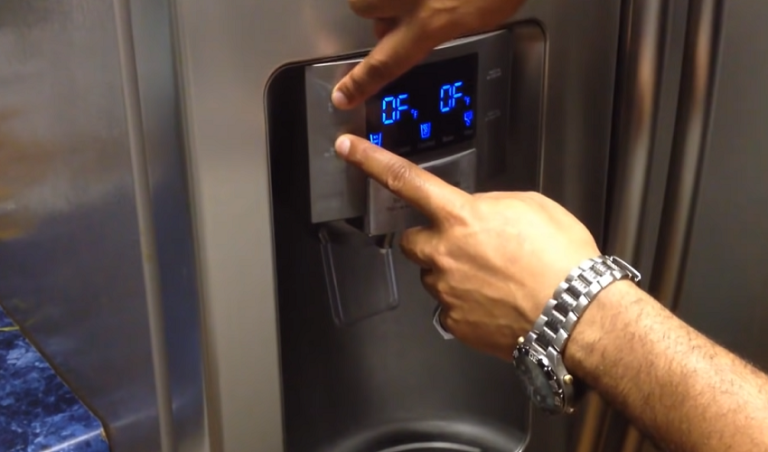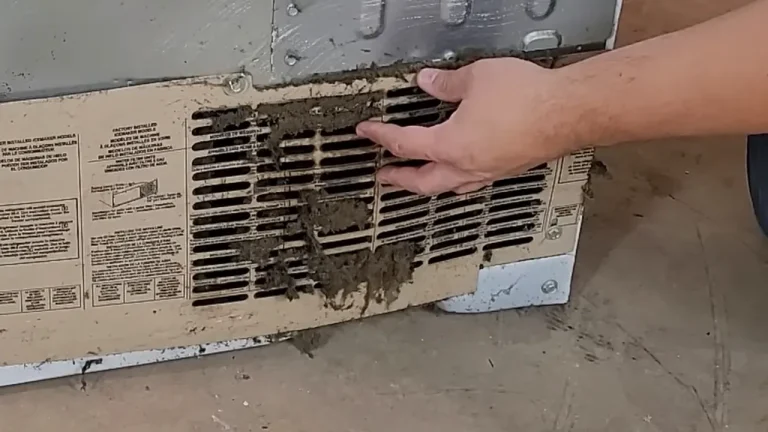Samsung Refrigerator Making Loud Humming Noise With Fix 2024
If your Samsung refrigerator is emitting a loud humming noise, it could be attributed to a few common factors. This may be caused by a faulty condenser fan motor, clogged condenser coils, a malfunctioning evaporator fan motor, improper leveling, ice maker issues, or vibration from the compressor. To address this, start by checking for any visible obstructions and ensuring the refrigerator is properly leveled. If the noise persists, it’s advisable to contact Samsung customer support or a professional appliance repair service for further assessment and resolution.
Why Is My Samsung Refrigerator Making a Loud Humming Noise?
A loud humming noise in a Samsung refrigerator can be attributed to several possible factors:
1. The Icemaker Is Struggling to Fill Up Under High Pressure
If your refrigerator’s ice maker is struggling to fill up under high pressure, there could be a couple of potential issues at play. Firstly, high water pressure can overwhelm the fill valve, causing it to malfunction or not shut off properly. This can lead to overfilling of the ice tray, resulting in a messy and inefficient ice-making process.
One solution is to adjust the water pressure going into the refrigerator. Many refrigerators have a water supply line with a built-in shut-off valve. By turning this valve slightly clockwise, you can reduce the water pressure. It’s important not to overdo this adjustment, as too low water pressure can also lead to problems.
If adjusting the water pressure doesn’t solve the issue, it might be a sign that the fill valve itself is faulty and needs to be replaced. In this case, it’s best to consult the refrigerator’s manual for specific troubleshooting steps or to contact the manufacturer or a professional technician for further assistance. Remember, working with water supply lines requires caution, and it’s advisable to turn off the water supply before making any adjustments or repairs.
2. The Icemaker Is Struggling to Fill Up Due to a Disconnected Water Supply
If the ice maker is struggling to fill up due to a disconnected water supply, it’s a clear indication that there is no water reaching the ice maker. This can happen if the water supply line has become disconnected, kinked, or blocked. To rectify this issue, first, check the water supply line behind the refrigerator to ensure it is properly connected and not twisted or kinked. If it appears to be disconnected, reattach it securely to the designated inlet valve.
Next, inspect the line for any visible signs of damage or obstructions. Sometimes, sediment or debris can accumulate in the line, obstructing the flow of water. If necessary, clean out the line or replace it if it’s damaged.
Once the water supply line is reconnected and free from obstructions, allow the ice maker some time to fill up. It may take a little while for the ice maker to start producing ice again, as it needs to cycle and fill with water before it can begin freezing.
If after these steps the ice maker still doesn’t fill up, it may be an issue with the inlet valve or a more complex internal component. In such cases, it’s recommended to consult the refrigerator’s manual for specific troubleshooting steps or to seek the assistance of a professional technician.
3. The Refrigerator Is Unstable
If your refrigerator is unstable, it can pose a safety hazard and potentially lead to damage to the appliance or its surroundings. Several factors could contribute to this issue. One common reason is uneven flooring. If the surface on which the refrigerator is placed is not level, it can cause the appliance to wobble or rock. To address this, use a leveling tool to ensure the refrigerator is positioned on an even surface.
Another possible cause of instability is improperly adjusted leveling legs or wheels. Most refrigerators come with adjustable legs or wheels to compensate for uneven flooring. Check that these are properly adjusted so that the refrigerator is stable and doesn’t rock when opened or closed.
If the refrigerator is still unstable after these adjustments, it could be a sign of a more serious issue with the appliance’s structural integrity or the leveling mechanism. In such cases, it’s recommended to consult the refrigerator’s manual for specific troubleshooting steps or to contact the manufacturer or a professional technician for further assessment and resolution. It’s crucial to address this issue promptly to prevent any potential damage or accidents.
4. Loud Humming Noise from Samsung Refrigerator Due to Obstructed Vents
If your Samsung refrigerator is emitting a loud humming noise, it could be attributed to obstructed vents. The vents play a crucial role in regulating air flow and maintaining an even temperature throughout the refrigerator. When they become blocked, the normal airflow is disrupted, causing the compressor and other components to work harder, which in turn can lead to increased noise levels.
To address this issue, start by inspecting the vents both inside and outside the refrigerator. Look for any food items, containers, or debris that may be obstructing them. Clear away any obstructions you find to allow for proper airflow. Additionally, check that the refrigerator is not positioned too close to the wall, as this can restrict ventilation.
Regularly cleaning the vents and ensuring they remain unobstructed can help maintain the efficiency and quiet operation of your refrigerator. If the noise persists even after clearing the vents, it may be indicative of a different issue, and it’s advisable to contact Samsung customer support or a professional appliance repair service for further assessment.
5. The Compressor Is Failing
If your refrigerator’s compressor is failing, it can lead to a range of concerning symptoms. The compressor is a crucial component responsible for circulating refrigerant and maintaining the proper temperature inside the fridge. When it starts to fail, you might notice various signs such as inconsistent cooling, longer-than-usual cooling cycles, or even a complete lack of cooling.
One prominent indicator of compressor issues is a loud, abnormal humming or clicking noise coming from the back of the refrigerator. This noise may signify that the compressor is struggling to start or is working inefficiently. Additionally, if you observe visible signs like oil leaks or excessive condensation around the compressor area, these can be further indicators of a failing unit.
A failing compressor often necessitates professional attention, as it is a complex and integral part of the refrigerator’s cooling system. If you suspect your compressor is failing, it’s advisable to reach out to a certified technician or contact the manufacturer for assistance. Replacing a compressor should be handled by a trained professional to ensure safety and the proper functioning of your refrigerator.
6. The Fan Motor Is Faulty
If the fan motor in your refrigerator is faulty, it can lead to several noticeable issues. The fan motor is responsible for circulating air within the refrigerator, helping to regulate temperature and ensure even cooling. When it malfunctions, you may experience problems such as uneven temperatures within the fridge, excessive frost buildup, or even a complete lack of cooling.
One telltale sign of a faulty fan motor is an unusual or loud noise coming from the refrigerator, particularly when the motor is struggling to operate. Additionally, if you notice that certain areas of the fridge are colder than others, this could be an indication that the fan is not distributing air properly.
If you suspect a faulty fan motor, it’s important to address it promptly. Continued operation with a malfunctioning fan motor can lead to further damage to the refrigerator’s cooling system. It’s recommended to consult a certified technician or contact the manufacturer for professional diagnosis and repair. Replacing a fan motor is a precise task that requires expertise to ensure the refrigerator functions optimally and efficiently.
7. Samsung Fridge Making a Loud Humming Noise Due to A Defective Icemaker
If your Samsung fridge is producing a loud humming noise, it could be attributed to a defective icemaker. The icemaker is a complex component that involves several moving parts, including a motor, to produce ice. When any of these parts malfunction, it can result in unusual noises. In the case of a defective icemaker, the motor or other internal components may be struggling to function properly, leading to the audible humming sound.
To address this issue, it’s advisable to first inspect the icemaker for any visible signs of damage or misalignment. Additionally, check if there are any ice cubes or obstructions that might be causing the motor to work harder than usual.
If the icemaker continues to produce a loud humming noise, it’s recommended to contact Samsung customer support or a professional appliance repair service for further assessment and resolution. Replacing or repairing a defective icemaker may require specialized knowledge and tools, so seeking professional assistance is often the best course of action.
8. The Door Seal Is Defective
If the door seal of your refrigerator is defective, it can lead to various issues that compromise the appliance’s efficiency. The door seal, also known as the gasket, is responsible for creating an airtight seal when the refrigerator door is closed. This seal is crucial in maintaining the internal temperature and preventing warm air from entering. When the seal is damaged or defective, you may notice symptoms such as temperature fluctuations inside the fridge, excessive frost buildup, or even the refrigerator running continuously.
One way to check for a defective door seal is to perform a simple dollar bill test. Close the door on a dollar bill, ensuring it is half inside and half outside the refrigerator. Then, try to pull the bill out. If it slides out easily without any resistance, it’s likely that the door seal is not creating a proper seal.
A defective door seal should be addressed promptly to prevent energy waste and maintain the freshness of your food. In most cases, replacing a faulty door seal is a straightforward process that can be done by following the manufacturer’s instructions. If you’re unsure about how to proceed, consider seeking professional help to ensure a proper installation.
9. The Defrost Timer Is Bad
If the defrost timer in your refrigerator is malfunctioning, it can lead to a range of problems with the appliance’s cooling system. The defrost timer is responsible for regulating the automatic defrost cycle, which prevents excessive frost buildup on the evaporator coils. When this component goes bad, it can disrupt the normal defrosting process.
One noticeable sign of a faulty defrost timer is excessive frost accumulation in the freezer section. You may also observe inconsistent cooling, as the frost buildup can obstruct the flow of cold air. Additionally, if you hear a clicking sound coming from the refrigerator at regular intervals, it may indicate that the defrost timer is attempting to initiate a defrost cycle but is failing to do so.
Replacing a defective defrost timer is a relatively straightforward task, but it’s important to consult the refrigerator’s manual or seek professional assistance to ensure proper installation. Ignoring a faulty defrost timer can lead to more serious issues, such as compressor damage or complete cooling system failure. If you suspect a bad defrost timer, it’s advisable to address the issue promptly to avoid further complications.
FAQ:
Why is my Samsung refrigerator making a loud humming noise?
There are several potential reasons for a loud humming noise in a Samsung refrigerator. Common causes include a faulty condenser fan motor, blocked condenser coils, a malfunctioning evaporator fan motor, improper leveling, ice maker issues, or compressor vibrations.
Can I fix the issue myself or do I need professional help?
Depending on the cause, some issues like clearing obstructed vents or adjusting leveling legs can be addressed by homeowners. However, if the problem persists or involves complex components like the compressor or fan motor, it’s recommended to seek professional assistance.
How can I troubleshoot the issue before calling a technician?
You can start by checking for visible obstructions, adjusting leveling legs, and ensuring proper ventilation around the refrigerator. Additionally, inspect for any signs of component damage or leaks.
Is a loud humming noise a serious problem?
It depends on the cause. While some issues may be minor, others could indicate a more serious problem with critical components. It’s best to address the issue promptly to prevent further damage.
Can I continue using the refrigerator if it’s making a loud noise?
It’s advisable to avoid using the refrigerator extensively if it’s emitting a loud humming noise. Continued operation may exacerbate the underlying issue and potentially lead to more significant problems.
Should I contact Samsung customer support or a local technician for assistance?
If your refrigerator is still under warranty, contacting Samsung customer support is a good first step. Otherwise, a local technician with experience in appliance repair can also provide assistance.
As an Amazon Associate I earn from qualifying purchases.
- Can You Put Clouds Shoes in the Washing Machine? With Tips & Tricks - April 10, 2024
- European Washing Machine vs American – History, Design, Technology - March 27, 2024
- Can You Put Boxing Gloves In The Washing Machine? – Expert Tips - March 25, 2024



![GE Cafe Refrigerator Problems [Solved 2024]](https://homeplacetips.com/wp-content/uploads/2023/12/GE-refrigerator-not-cooling_-Check-these-5-things-first_000056819-768x432.webp)
![Brand New Fridge Making Noise [Easy Fix]](https://homeplacetips.com/wp-content/uploads/2024/01/LG-Refrigerators-Understanding-Noises-From-An-LG-Refrigerator_000074741-768x432.webp)


